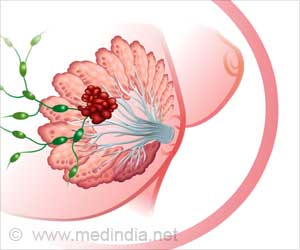Highlights:
- Hormonal treatment of breast cancer destroys cancer cells but induces some tumor cells to enter a “sleeping or dormant” state, that could awaken long after treatment is complete
- About 30% of breast cancer patients who receive hormone treatments have a recurrence of their cancer up to 20 years later, and this returning cancer is more aggressive and much more difficult to treat
- Future research needs to focus on ways to tackle these “dormant cells”, preventing cancer recurrence and potentially saving the lives of innumerable women with breast cancer
Read More..
Do Hormonal Treatments Induce Cancer Cells to Enter a Dormant State?
- An important component of breast cancer treatment is hormonal treatment. This includes targeted hormone therapy such as aromatase inhibitors or tamoxifen, that block estrogen receptor that are believed to fuel tumor growth.
- For reasons that remain unclear, scientists believe that the hormonal treatment triggers tumor cells to enter an “inactive dormant” state only to become reactivated even several years after initial treatment causing cancer recurrence that is often associated with a poorer prognosis
Dr Luca Magnani, from Imperial’s Department of Surgery and Cancer and lead author of this study, said: "For a long time scientists have debated whether hormone therapies - which are a very effective treatment and save millions of lives - work by killing breast cancer cells or whether the drugs flip them into a dormant ’sleeper’ state. If we can unlock the secrets of these dormant cells, we may be able to find a way of preventing cancer coming back, either by holding the cells in permanent sleep mode, or be waking them up and killing them."
Unlocking Effects of Hormone Therapy on Breast Cancer Cells
- The team looked at 50,000 single breast cancer cells in the lab
- They found that exposing the tumor cells to hormones rendered at least some of these cells to enter into an inactive dormant state
- Interestingly, these dormant or sleeper cells appear to be an intermediate stage before cancer becomes resistant to treatment
- These sleeper cells were also more likely to travel around the body and spread to distant sites and may wake up in other sites resulting in secondary cancers
In fact, previous research by the same team had analyzed how breast cancer cells become resistant to hormone treatment, and found that cancer cells make their own ’fuel’ that prevents them from being starved of energy to grow by the cancer drugs. The findings of the current study could be another piece in the puzzle seeking answers to hormonal effects on breast cancer cells.
The exact mechanism by which the breast cancer cells switch off and enter a dormant mode and switch back on to an active mode is not clear, but the study team feel that unlocking the secrets of these dormant cells might help in preventing cancer recurrence, either by keeping the cells permanently in the sleep mode, or activating them and killing them.
Scope of the Study
- Further research can determine if prolonging duration of hormone treatment for breast cancer could prevent sleeper cancer cells from waking up
- Future research can identify how “dormant” cells are created and explore methods to tackle these “dormant” cells and preventing cancer recurrence
Reference:
- Single-cell transcriptomics reveals multi-step adaptations to endocrine therapy - (https://doi.org/10.1038/s41467-019-11721-9)
Source-Medindia
















